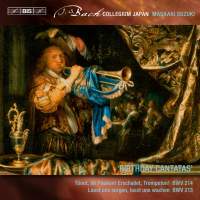Texte paru dans: / Appeared in: |
|
|
Outil de traduction ~ (Très approximatif) |
|
|
Reviewer:
George Chien Maybe we can blame it on Beethoven. We tend to undervalue Bach’s secular cantatas in part, I think, because we can’t comprehend how he could have taken some of their texts and premises seriously. We don’t question his religious convictions. We do know that he had some doubts about his immediate superiors. But royalty? Bach was 30 years old when Louis XIV went on to whatever unearthly reward he had earned, and he died 39 years before the French Revolution put an emphatic end to the divine right of kings. In all likelihood, Johann Sebastian, unlike Ludwig van Beethoven, would have stepped aside for a passing prince. So he could, and he did in Cantata 213, set to music an allegorical drama equating the 11-year-old Prince Friedrich Christian of Saxony to the mythical hero Hercules, and, what’s more, promoting the assumption that the prince would in the end choose Virtue (Tugend) over Pleasure (Wollust). And Bach did it with consummate skill—enough so that he borrowed much this music for his forthcoming Christmas Oratorio. He called Lasst uns sorgen, lasst uns wachen, BWV 213, a “Dramma per musica.” Although it has characters and the semblance of a story line, it’s not exactly an opera, but it is evidence that Bach could have written one if he’d had the opportunity. Tönet, ihr Pauken! Erschallet, Trompeten!, BWV 214, is also labeled “Dramma per musica,” but has even less of a plot. A birthday tribute to the Electress Maria Josepha, it’s basically a conversation among its four allegorical characters, the goddesses of Peace, War, Truth, and Rumor. Bach again tapped this cantata for the Christmas Oratorio, most notably for its aptly named opening chorus. Bach dealt with this material seriously, and so does Masaaki Suzuki. The virtues of his epic sacred cantata series are all in evidence here. Listen to it. Seriously. And enjoy. | |
|
|
|
|
Cliquez l'un ou l'autre
bouton pour découvrir bien d'autres critiques de CD |
|




